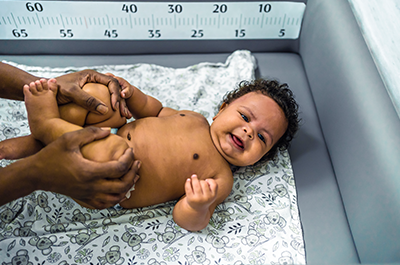Vitamin K plays a vital role in our health—it helps our bodies make proteins that are needed for blood clotting. When we don’t have enough vitamin K, we’re at a heightened risk of life-threatening blood loss.
Fortunately, for adults and children, there are many great sources of vitamin K, from leafy greens and avocado to chicken and Brussels sprouts. But infants aren’t born with sufficient levels of vitamin K. Vitamin K doesn’t cross into the placenta well, and it’s not prevalent in breastmilk. While formula milk is fortified with vitamin K, within the first few months of life, babies haven’t developed the gut bacteria needed to absorb vitamin K.
That’s why it’s necessary for newborns to get a one-time shot of vitamin K about an hour or two after they’re born. “The vitamin K shot has been standard of care for about 60 years now, but unfortunately, more parents have been refusing it,” says Daniel Rito, D.O., a pediatrician at Henry Ford Health. “Because of the shot, you don’t hear about vitamin K deficiency bleeding (or VKDB) anymore, but it’s a very serious, life-threatening condition that can also cause brain damage in infants.”
Why Are Parents Refusing The Vitamin K Shot?
There has been a general reticence toward immunizations—likely stemming from the divisive myths surrounding the COVID-19 vaccines. “Not that the vitamin K shot is an immunization—it isn’t—but to people refusing it, it falls into that same line of thinking,” says Dr. Rito.
Others are concerned that the vitamin K shot contains a small amount of a shelf-stabilizing preservative, but no studies have shown that this causes any issues. “The risk of not giving your child a vitamin K shot is so much greater than the theoretical (and unproven) risk associated with the preservative in the shot,” says Dr. Rito. “That said, if parents are concerned, we do have a preservative-free option.”
It’s also important to note that babies of all sizes—premature babies included—must have a vitamin K shot. “Premature babies get a smaller dose, but it’s just as important (if not more important) for them to have a vitamin K shot,” says Dr. Rito.
As Your Baby Grows, Help Them Maintain A Vitamin K-Rich Diet
As your baby gets older—around four to six months of age—their digestive system will be a bit more developed and baby foods will be introduced, so they’ll be able to get vitamin K from food sources like broccoli, spinach, Brussels sprouts, chicken, green beans, kiwi, avocado and more.
“It’s just for those first few months of life that are so crucial to have a vitamin K shot,” says Dr. Rito. “I urge all parents to have their child get the vitamin K shot right after they’re born. And if you have any questions, don’t hesitate to reach out to your pediatrician.”
To find a pediatrician at Henry Ford Health, visit henryford.com or call 1-800-436-7936.
Daniel Rito, D.O., is a pediatrician specializing in neonatal and perinatal medicine. He sees patients at Henry Ford Hospital in Detroit and Henry Ford Medical Center—New Center One in Detroit.



